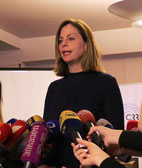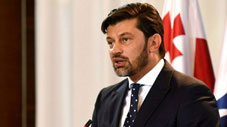
NDI says 62% of Georgians are undecided about their political choices
By Tea Mariamidze
Friday, July 28
The National Democratic Institute (NDI) and CRRC Georgia have released the results of the political part of their survey, saying 62 percent of respondents are undecided about their political choices ahead of the October local elections.
When asked ‘which party is closest to you?’ almost half of the surveyed Georgians said ‘no party’ or ‘don’t know’. When specifically asked if they were decided or undecided about how they would vote, 62 percent of respondents are undecided, which constituted 68 percent of younger Georgians, over half of those who are likely to vote.
“This large number of undecided voters presents both a challenge and opportunity for parties. With weeks until the elections, they have plenty of work to do to inspire and motivate citizens, offer relevant policies, and demonstrate meaningful contrast with their opponents,” said Laura Thornton, the NDI’s Senior Director.
As for the political parties and politicians, 23 percent select Georgian Dream (GD), 9 percent the United National Movement (UNM), 4 percent for both European Georgia (EG) and the Alliance of Patriots, and 3 percent for the Labor Party.
When asked which party would they vote for if elections were tomorrow, the numbers do not significantly change: 22 percent GD, 7 percent UNM, and 3 percent EG, with the numbers for likely voters showing 27 percent GD, 8 percent UNM and 3 percent EG.
For the Tbilisi mayoral race, 30 percent support GD candidate Kakha Kaladze, 19 percent independent candidate Aleko Elisashvili, 18 percent UNM’s Zaal Udumashvili, 5 percent EG’s Elene Khostaria, and 3 percent to the Labor Party candidate.
“With the campaign yet to begin and such a small number of decided voters, these poll numbers cannot possibly predict future outcomes, but rather serve as indication that the playing field is still wide open and unpredictable,” said Thornton.
Moreover, Georgians report that bribing, harassment, and misuse of the state budget are the biggest barriers to free and fair elections, although most believe the Central Election Commission (CEC) will perform average (47 percent) or well (29 percent). Georgians are divided on whether it is important to have a balanced representation of male and female candidates in the upcoming election, and believe that an increase in the number of female City Council members would have either a positive impact (43 percent) or no impact (42 percent).
Furthermore, Georgians give mixed assessments to the country’s state of democracy, although freedom of speech, free and fair elections, protection of human rights receive net positive evaluations at 51 percent, 35 percent, and 36 percent, respectively.
One-third of citizens reported a positive condition of the rule of law; less than one third of respondents also reported a positive condition of citizen participation in public life, curbing corruption, and government responses to citizen concerns.
As for the case of Azerbaijani journalist Afghan Mukhtarli who was kidnapped from Tbilisi two months ago, 72 percent of Georgians are aware of the case. Only 14 percent of those who are aware of the incident believe the government should not take responsibility for this, while 78 percent believe the government must take responsibility because they could not stop the kidnapping and 82 percent believe the government is responsible because it should protect human rights.
“As a country that has prioritized human rights, it is essential that the government continues to serve as a beacon in the region and a place of refuge for those who are facing political repressions,” Laura Thornton stated.
The results reflect data collected from June 18 to July 9, through face-to-face interviews with a nationwide representative sample of Georgia’s adult population (excluding the occupied territories) comprised of 2,261 completed interviews.


